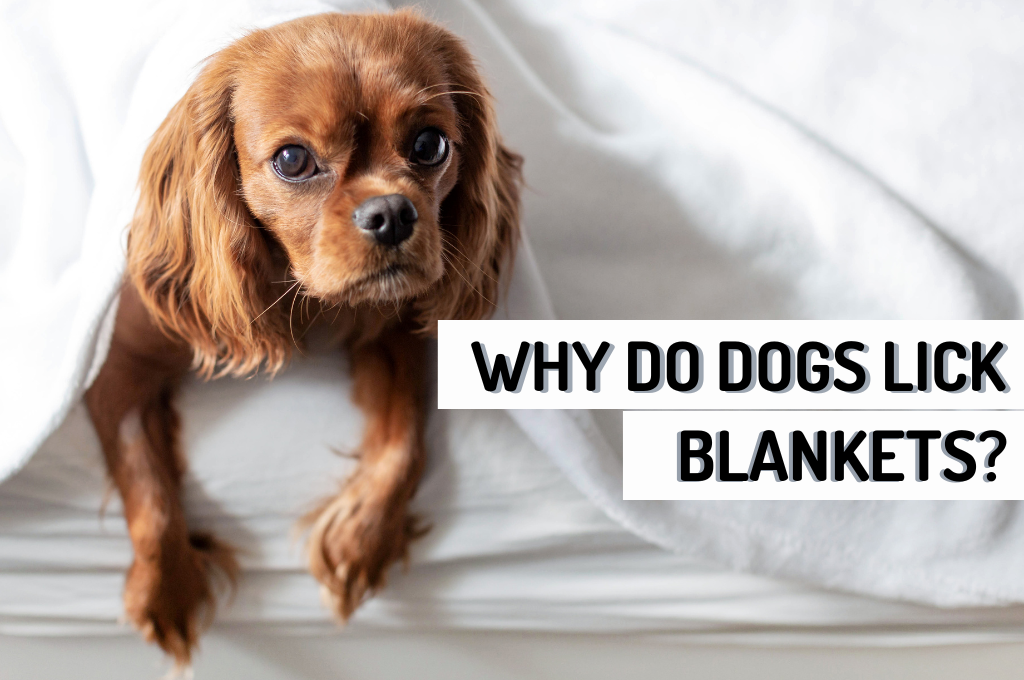Licking is a natural behavior for dogs, but sometimes it can become a cause for concern. Many pet owners wonder why their dogs lick blankets and what could be causing this behavior. In this article, we will explore the reasons behind dogs licking blankets and provide tips on how to prevent it.
Reasons Why Dogs Lick Blankets
Dogs may lick blankets for various reasons, including boredom, anxiety, dietary issues, medical conditions, deficiencies in minerals or vitamins, or simply out of habit. Understanding the underlying cause of your dog’s behavior is important in order to address it effectively.
1. Gastrointestinal Problems
If your dog has a digestive problem, they may lick blankets to alleviate nausea and discomfort. Licking releases endorphins, which act as a natural painkiller. If you suspect that your dog’s licking is due to a digestive issue, it is best to consult a veterinarian for a proper diagnosis.
2. Dental Problems
Dogs with dental issues may lick blankets to try to alleviate mouth pain or discomfort. If your dog exhibits signs of dental problems, such as excessive drooling, whining, or reduced appetite, it is important to have their teeth checked by a veterinarian.
3. Anxiety
Licking can be a self-soothing behavior for dogs experiencing anxiety or stress. If your dog licks blankets when they are overstimulated or when you are about to leave the house, it may be a sign of separation anxiety. Addressing your dog’s anxiety is crucial to prevent it from developing into obsessive-compulsive behavior.
4. Sensory Motives
Some dogs may lick blankets because they are attracted to the scent or taste left behind by their owners. This behavior can provide a sense of comfort and security. However, if your dog only licks specific blankets or stops licking after they have been washed, it may be due to their sensory preferences.
5. Food Left Behind
If you often eat snacks or meals while wrapped in a blanket, food particles may become trapped in the fabric. Dogs, especially those with dietary restrictions or nutritional deficiencies, may lick blankets to compensate for their cravings.
6. Problems with Diet
Some dogs may lick blankets excessively due to stomach pain or nausea caused by gastrointestinal issues or food allergies. Consulting with a veterinarian and gradually altering your dog’s diet can help alleviate this behavior.
7. Nausea
Excessive licking, including licking the air, can be a sign of nausea in dogs. Dogs may lick to settle their stomachs and alleviate the urge to vomit. If your dog exhibits this behavior frequently, it is important to evaluate their diet and make necessary changes.
8. Other Likely Reasons
In some cases, dogs may lick blankets to seek attention or relieve an itch. They may also continue licking if inadvertently rewarded for the behavior. Providing alternatives such as chew toys and redirecting their attention can help discourage blanket licking.
How to Prevent Dogs from Licking Blankets
Preventing your dog from licking blankets requires consistency and patience. Here are some tips to help discourage this behavior:
Check Their Diet: Ensure that your dog’s diet is suitable for their age, size, and breed. If necessary, consult a veterinarian to address any nutritional deficiencies or food allergies.
Distract Them: Provide your dog with engaging toys and puzzles to help redirect their desire to lick. Teaching them the “Leave It” command can also be effective in controlling undesirable behavior.
Address Anxiety: If your dog’s licking is a result of anxiety, consider providing them with socialization opportunities and engaging activities. Taking them for walks, introducing them to other dogs, and spending quality time with them can help alleviate their anxiety.
Avoid Reinforcing the Behavior: Be mindful of inadvertently rewarding your dog for licking blankets. Avoid giving them attention, treats, or toys when they engage in this behavior.
By understanding the underlying reasons behind your dog’s licking behavior and implementing appropriate prevention strategies, you can help them break this habit and ensure their well-being.
Frequently Asked Questions
Why does my dog lick blankets?
Dogs may lick blankets as a self-soothing behavior or due to various underlying reasons such as anxiety, boredom, dietary issues, or medical conditions. Understanding the cause of your dog’s behavior is important in order to address it effectively.
Is it normal for dogs to lick blankets?
It is not uncommon for dogs to lick blankets as it provides them with a sense of comfort and security. Additionally, licking can help alleviate stress and anxiety in dogs.
Does blanket licking indicate a problem?
While occasional blanket licking may not be a cause for concern, excessive and persistent licking could indicate underlying issues such as anxiety, stress, boredom, gastrointestinal problems, or allergies. If you notice excessive licking or changes in behavior, it is advisable to consult a veterinarian.
Can blanket licking be a sign of anxiety?
While excessive licking has been associated with anxiety and stress relief in dogs, recent studies have also suggested that gastrointestinal issues may contribute to this behavior. It is important to consider both factors when addressing your dog’s licking behavior.
How can I discourage my dog from licking blankets?
To discourage your dog from licking blankets, provide them with alternative sources of stimulation such as chew toys and games. Teaching them the “Leave It” command and addressing any underlying anxiety or boredom can also help prevent this behavior.
Conclusion
Dogs may lick blankets for various reasons, including anxiety, boredom, dietary issues, or medical conditions. Understanding the underlying cause is essential in order to address the behavior effectively. By implementing preventive measures and seeking appropriate veterinary advice when necessary, you can help your dog break the habit of licking blankets and ensure their well-being.
Web Resources:
Recommended Articles:
